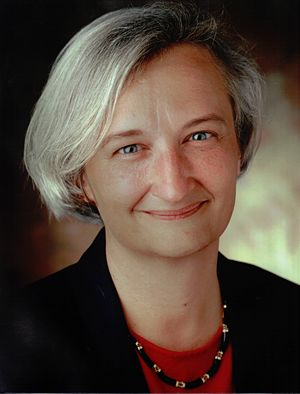Dr. Chris Maziar, VP and senior associate provost, Universiy of Notre Dame
Guest Speaker for ECE 400, Spring 2012
Biography
As Vice President and Senior Associate Provost at the University of Notre Dame, Dr. Maziar has primary responsibility for academic planning and budget. She provides oversight for the development of the academic budget, for the appointment process for faculty and the promotion process for non-tenure track faculty, for the implementation of the strategic plan. Within the Office of the Provost, she also has responsibility for the Office of the Registrar and the University Archives. She currently serves on the Cornell University College of Engineering Advisory Council, the Purdue University College of Engineering Advisory Council, and is a member of the Board of Directors for the Oak Ridge Associated Universities.
From 2002-2004, Dr. Maziar served as Senior Vice President for Academic Affairs and Provost (previously titled Executive Vice President and Provost) at the University of Minnesota. In this position, which she assumed July 15, 2002, she served as the University's chief academic officer. As provost for the Twin Cities campus, she was directly responsible for all colleges and academic units on the Twin Cities campus except those in the Academic Health Center. The office also oversaw the University Libraries, the Office of Information Technology, the Office of Admissions, the Office of Student Affairs, and the Office of Enrolled Student Services.
From 1998-2002, Dr. Maziar served as Vice President for Research and Dean of the Graduate School at the University of Minnesota. As Vice President for Research, she was responsible for the oversight and administration of an externally funded research program of approximately $500 million dollars conducted on the four campuses of the University of Minnesota system. She provided executive oversight of the implementation of a new sponsored projects administration system designed to improve compliance in the university’s research programs as well as to provide researchers with much needed tools to manage their programs. She was also responsible for the University of Minnesota’s technology commercialization activities. As Dean of the Graduate School, her administration provided the central coordination of over 150 graduate programs serving over 7000 students. Dr. Maziar also was instrumental in creating the 21st Century Graduate Fellowship Endowment, which matches private gifts for fellowships through royalty funds generated by sales of a drug patented by a University researcher. Nearly 200 new fellowship endowments have been established since the program began in 2000.
Dr. Maziar served as the chair of the CIC Graduate Deans from 2000-02 and chaired the Rhodes Scholarship Selection Committee for Minnesota from 1998-2001. She was appointed in 2001 to the Minnesota Technology Enterprise Board and also is a member of the Commission on University of Minnesota Excellence, which was established by the Minnesota Legislature. From 1998-2002, she was a member of the Minnesota Technology Inc. Board of Directors and the Minnesota High Technology Association’s University of Minnesota Committee.
Born in Columbus, Ohio in 1959, Dr. Maziar received the BSEE (with Highest Distinction) in 1981, the MSEE in 1984 and the Ph.D. in 1986, all from Purdue University, West Lafayette, Indiana. In 1987, she joined the faculty of the Department of Electrical and Computer Engineering at The University of Texas at Austin, where she also served the campus as a Vice Provost for three years. As a Texas Vice Provost, Dr. Maziar’s primary responsibility was the implementation and administration of the Performance Based Instruction System and the Deans’ Fellows program. These two programs combined to create a structure to support annual instructional planning in academic departments as well as to support a much needed faculty development program. They also gave departments and colleges, for the first time, much needed flexibility in managing their instructional resources while at the same time providing the oversight to ensure that the undergraduate instructional program received the attention it deserved.
At Texas, Dr. Maziar was an innovator in the classroom, developing several graduate courses, a required freshman course designed to improve the performance of new electrical engineering students, and a team-taught interdisciplinary course entitled “On the Edge of the Electronic Frontier: The Technology, Culture and Politics of the Internet.” As a faculty member, Dr. Maziar also demonstrated a strong commitment to faculty governance, serving on the University of Texas Faculty Senate as well as on the Graduate Assembly. She chaired the Faculty Grievance Committee, served as a member of the Faculty Budget Advisory Committee and was selected as chair of the Educational Policy Committee. She was elected to the chair of the Graduate Assembly in 1995 but relinquished that position upon her appointment as Vice Provost.
Dr. Maziar received the National Science Foundation’s Presidential Young Investigator Award in 1990 and the Semiconductor Research Corporation’s Technical Excellence Award in 1992. She was named a Fellow of the American Association for the Advancement of Science in 2002. She received the Outstanding Electrical Engineer Award from Purdue University in 2000 and the Distinguished Engineer Award in 2003. Dr. Maziar's research interests involved developing models and computer simulation tools which describe charge transport in semiconductor device structures, transport phenomena in ultra-small structures, structures under high electric fields and structures composed of superlattices or novel materials. Her Ph.D. students have assumed challenging positions at major microelectronics corporations such as Intel, Motorola, Micron and AMD. She has authored or co-authored over 150 research publications and presentations.


